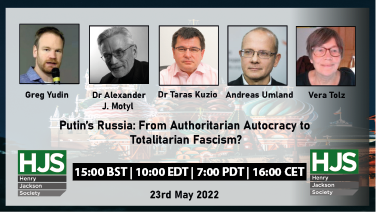Putin’s Russia: From Authoritarian Autocracy to Totalitarian Fascism?

- This event has passed.
Putin’s Russia: From Authoritarian Autocracy to Totalitarian Fascism?
23rd May 2022 @ 3:00 pm - 4:00 pm

Russia transformed from an authoritarian system into a dictatorship following constitutional changes in 2020 that allowed Vladimir Putin to remain in power until 2036, but de facto made Putin president for life. Since then, collective leadership has been replaced with rule by a dictator of a kind last seen in Joseph Stalin’s USSR. The emergence of a dictatorship has led to a totalitarian regime in Russia. Since 2020, all independent political thought and media have been closed and protests ruthlessly crushed. Putin’s speeches both before and since the invasion of Ukraine, with the search for domestic and external traitors, are a throwback to the Stalin era. Domestic traitors in the Soviet Union include anybody critical of the authorities, while external traitors are Ukrainians who refuse to accept they are a Little Russian branch of the pan-Russian nation and the West that maintains a “puppet” regime in Ukraine. The Russian state is mobilizing society through the promotion of a cult of war.
The Henry Jackson Society is pleased to invite you to a panel discussion where two Russian and two Western experts will discuss the type of regime that has emerged in Putin’s Russia, what implications this has for the war in Ukraine and relations with the West and the policies that should be undertaken in response.

Greg Yudin is a Russian political philosopher at The Moscow School of Social and Economic Sciences. Yudin is an expert in theory of democracy and public opinion. He is columnist for leading Russian online magazines Republic and Project.

Alexander J. Motyl is professor of political science at Rutgers University. He is the author of Imperial Ends: The Decay, Collapse, and Revival of Empires (2001); Revolutions, Nations, Empires: Conceptual Limits and Theoretical Possibilities (1999); and Dilemmas of Independence: Ukraine after Totalitarianism (1993). National Questions: Theoretical Reflections on Nations and Nationalism in Eastern Europe is forthcoming in 2022.

Andreas Umland is a Research Fellow at the Swedish Institute of International Affairs, editor of Soviet and Post-Soviet Politics and Society” published by ibidem-Verlag and distributed by Columbia University Press. He is a co-editor of Forum for Contemporary East European History and Culture (in Russian), and member of the editorial boards of the Journal of Soviet and Post-Soviet Politics and Society, Forum for East European Ideas and Contemporary History (in German), Fascism: Journal of Comparative Fascist Studies, and The Ideology and Politics Journal.

Vera Tolz is Sir William Mather Professor of Russian Studies at the University of Manchester. Her most recent books are Nation, Ethnicity and Race on Russian Television: Mediating Post-Soviet Difference (with Stephen Hutchings); ‘Russia’s Own Orient’: The Politics of Identity and Oriental Studies in the Late Imperial and Early Soviet Periods; Nationalism and Empire at War (2014) and The Russia: Inventing the Nation (2001). In 2012-2016, she was Co-Director of the UK’s national Centre for Language-Based East European Area Studies. She is a Fellow of the UK’s Academy of Social Sciences.

Taras Kuzio is a Research Fellow at the Henry Jackson Society and Professor in the Department of Political Science, National University of Kyiv Mohyla Academy. His previous positions were at the University of Alberta, George Washington University, and University of Toronto, International Institute of Strategic Studies, and School of Advanced International Studies, Johns Hopkins University. Taras Kuzio holds a PhD in political science from the University of Birmingham, England, an MA in Area Studies (USSR, Eastern Europe) from the School of Slavonic and East European Studies, University of London, and a BA in Economics from the School of European Studies, University of Sussex. He held a Post-Doctoral Fellowship at Yale University. Taras Kuzio is the author and editor of 22 books, 38 book chapters and over 130 scholarly articles on Soviet, Eurasian, Russian, and Ukrainian politics, colour revolutions, nationalism, geopolitics, and international relations.
***
EVENT SUMMARY
The Henry Jackson Society was delighted to host this event, which sought to discuss how Vladimir Putin has transformed Russia from an oligarchy into a totalitarian state under his complete control. In 2020 Vladimir Putin altered the constitution to allow himself to stay in power till 2036 while escalating repression on the opposition and independent media. Moreover, since the invasion of Ukraine his rhetoric has focused on identifying traitors, in order to mobilise the Russian State for war. The discussion focused on how best to describe the Putin regime and whether it can be called fascist.
All though the speakers disagreed on whether the term fascist is a useful term to describe Putin’s regime, they all agreed that there had been an ideological shift in Russia between Ukraine’s Orange Revolution and the invasion of Crimea. Professor Tolz and Mr Umland argued that Putin was not fascist as he does not command any significant loyalty from the Russian population, and he is not seeking a revolutionary state. Mr Yudin argued that regime has evolved into something more fascist while Dr Motyl argued that Putin has always displayed fascist tendencies.
RELATED EVENTS
British General Election Campaigns 1830-2019: Can The Past Inform The Future?”
The British general election is the linchpin of our liberal democracy, and its results are often fundamental to how we live. With the next UK general election looming, there is therefore … Continued



